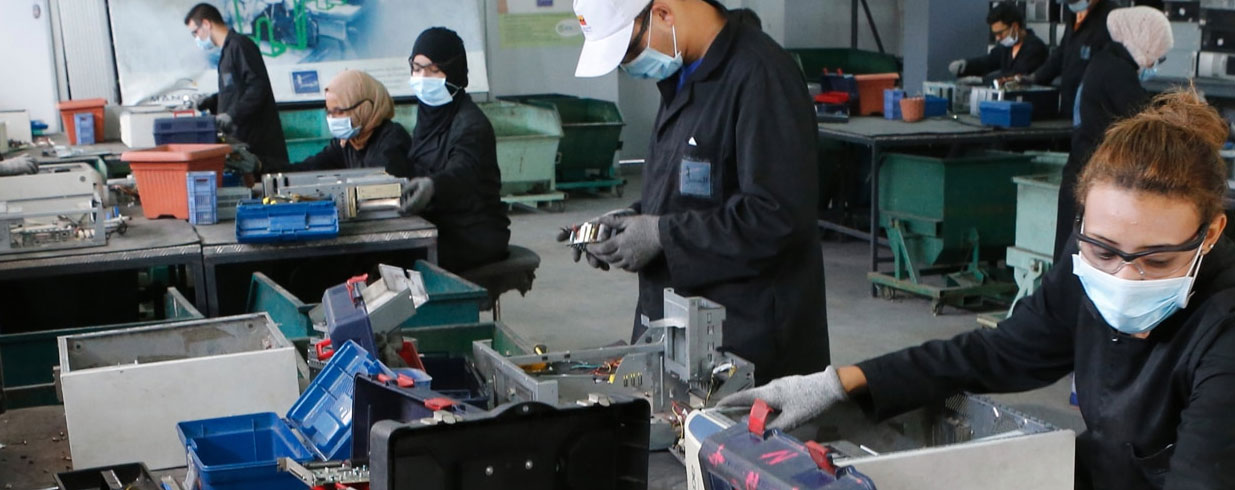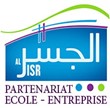With Green Chip, “Al Jisr” association collects used computer equipment and either repairs it before making it available to public schools or recycles it. The association also aims to be a bridge (al jisr in Arabic) by supporting the graduates towards employment and entrepreneurship.

Green Chip, apprenticeship training program and e-waste management
OBJECTIVES
- Train school drop-outs for green jobs (“computer maintenance agent”).
- Run a refurbishing program for IT equipment collected from public organisations and private companies, giving them a second life.
- Support a dismantling and sorting process followed by an eco-friendly treatment.
BACKGROUND INFORMATION AND LOCATION
General information on the territory:
• Location: Casablanca, Oujda, Berkane and Jerada cities (joining in 2022: Tangiers)
• Country: Morocco
• Population of the urban area of Casablanca region 2020: 7,408,213 million inhabitants
• Density: 15,263 inh/km2
General information on e-waste management:
Refurbishing/recycling of computers, printers, servers, terminals, cell phones, standard phones, etc.
General information on the project sites:
• Surface of the 2 sites: 3,000 m2
• Capacity of the waste: 280 t/yr.
• Quantities sent to recycling: 250 t/yr.
• Quantities of electronic waste extracted and delivered to MANAGEM (Moroccan company active in the mining industry): 974 t/yr
• Quantities of hazardous waste diverted from landfills: 200 t/yr.
IMPLEMENTING BODIES
Green Chip was developed in 2010 by the non-profit Al Jisr “Association Partenariat Ecole Entreprise”, following a positive experience called “Atelier numérique” in 2006, that offered training, apprenticeship and diplomas in computer technology for young people who have dropped out of secondary school.
KEY STAKEHOLDERS INVOLVED
Al Jisr co-creates educational and social inclusion projects by involving different stakeholders in capacity building activities, including:
• Académie Régionale de l’éducation Nationale (AREF Casablanca- Ministry of Education),
• Délégation régionale de la Formation Professionnelle,
• MANAGEM
From the donor side:
• DROSOS Foundation
• Public and private enterprises
• The British Council and Spanish Agency for International Development Cooperation (AECID)
The private sector stakeholders offer and provide internships for the apprentices.
GENERAL CONTEXT
Al Jisr association works with all sectors of Moroccan society that have a vested interest in improving educational outcomes, and fosters public-private partnerships in the education sector towards a sustainable development. It is within this concept that the Green Chip initiative was born:
• create a training course on computer technology to empower young unemployed school drop-outs.
• raise awareness about the importance of proper waste management as part of a sustainable development.
The aim is for the beneficiaries to have state-recognised diplomas that enable them to successfully enter the labour market.
DESCRIPTION OF THE ACTIVITIES
The “Green Chip” programme carried out in the Casablanca region is an initiative with specific pedagogical methodologies and support systems, aiming to promote the training of vulnerable young people for their eventual professional integration. The training within the CFA Green Chip (apprentice training centre) is spread over an 8-month period with an additional 3-month internship in a collaborating company. The courses in computer technology are supplemented with specific modules on other skill sets that help employability: life skills, starting an entrepreneurial project, communication in French. The refurbished computers that result from this effort, are used to equip classrooms in elementary and secondary public schools. The rest are dismantled and recycled.
Another Green Chip programme, called “Green Chip 2.0”, was carried out in the Oujda region. It is a training course for technical digital professions (web/mobile development, data developer, digital transformation, etc.) that does not require any prior technical qualifications. Green Chip 2.0 applies active pedagogy in its 12-month training process, with the support of a multidisciplinary team of professionals.
FINANCING AND COST RECOVERY CONTEXT
The total budget of the Green Chip initiative is around 1.8 million MAD, secured mainly from the above-mentioned donors. The association also conducts income-generating activities, such as issuing training certificates, consultancy services, etc.
MAIN ACHIEVEMENTS AND RESULTS
• Reduced unemployment rate of low-skilled youth by enhancing employability and encouraging self-employment.
• Provision of a solution for the treatment of computer waste contributing to a better quality of the environment.
• Reduced digital divide via the free distribution of refurbished computers to Moroccan public institutions.
The following are some figures on waste processed and computers donated:
• 974 tonnes of computer waste delivered to MANAGEM since 2010 for treatment and recycling according to the standards in force;
• 3,800 computer products recycled and distributed in Casablanca since 2010;
• 458 schools (primary, secondary and high schools) as well as associations have benefited from the Green Chip programme.
Social inclusion:
• Professional integration: over 600 Green Chip graduates.
• Over 60% of the graduates are integrated in formal jobs and some have followed a successful career.
• Reduction of the digital gap in public schools.
Environmental impact
• Re-use of resources and hazardous waste not ending up in landfills.
KEY FACTORS OF SUCCESS
The success of such an action relies on several factors:
• The good quality of the training programs and learning pedagogy, designed and delivered by proficient trainers specialised in the management of hazardous waste such as WEEE.
• Overall support to the young trainees up until they obtain their diploma and get jobs.
• Partnership with schools.
• Involvement of key partners: Ministry of National Education and Professional Training (legitimacy and support), donors and the private sector (support the apprenticeship and employment of the graduates), recyclers (purchase of extracted products and materials), etc.
• An effective communication plan.
BOTTLENECKS, LIMITATIONS AND CHALLENGES
Challenges that need to be addressed are:
• The lack of a structured multi-stakeholder participatory governance scheme to facilitate the initiative and consensus building;
• The absence of green taxation or regulation to encourage the re-use and recycling processes;
• Ensuring the standard and competitiveness of the training courses.
LESSONS LEARNED AND REPLICABILITY
The initiative is successful overall, in giving young people a chance to escape from a precarious situation and be part of the labour market, while at the same time contributing to better resource management.
Replicability of the project in more regions of Morocco is ongoing, along these lessons learned:
• Target well the beneficiaries and partners (schools, companies to host trainees and graduates, recyclers, etc.).
• Have key partners such as the Ministry of Education so that the activities of the initiative and the diplomas awarded are recognised.
• On-going fund-raising to keep the initiative alive.
REFERENCES, LINKS TO FURTHER INFORMATION
• https://www.lesiteinfo.com/economie/awb-tout-savoir-sur-le-programme-green-chip-avec-lassociation-al-jisr/ Lesiteinfo jeudi 26 juillet 2018 – 11:13
• https://quid.ma/societe/la-8eme-promotion-du-programme-green-chip-a-l-honneur-a-casablanca Par la rédaction Juil 26 à 09H58 Quid Actus & Analyses
• https://www.youtube.com/watch?v=RNu3zbFmaJY
• https://www.youtube.com/watch?v=6XlZi7ml-Nk
• https://www.youtube.com/watch?v=VZH3CqknFlg
• https://www.youtube.com/watch?v=vYXQyCZA5OU
• https://www.youtube.com/watch?v=AkZE9t54rFE
• https://www.youtube.com/watch?v=HzqL0repgR0
• https://www.facebook.com/CFA-Al-Jisr-Green-chip–161367137315613/
Key information
Topic: re-use, recycling, social inclusion
Waste fraction: WEEE (Waste from electrical and electronic equipment)
Target group: Public and private enterprises, 18 to 30 years old NEETS (“Not in Education, Employment, or Training”)
Instruments: Infrastructure, Training centers; E-waste platforms, Youth socio professional inclusion
Date of the implementation
Since 2010
